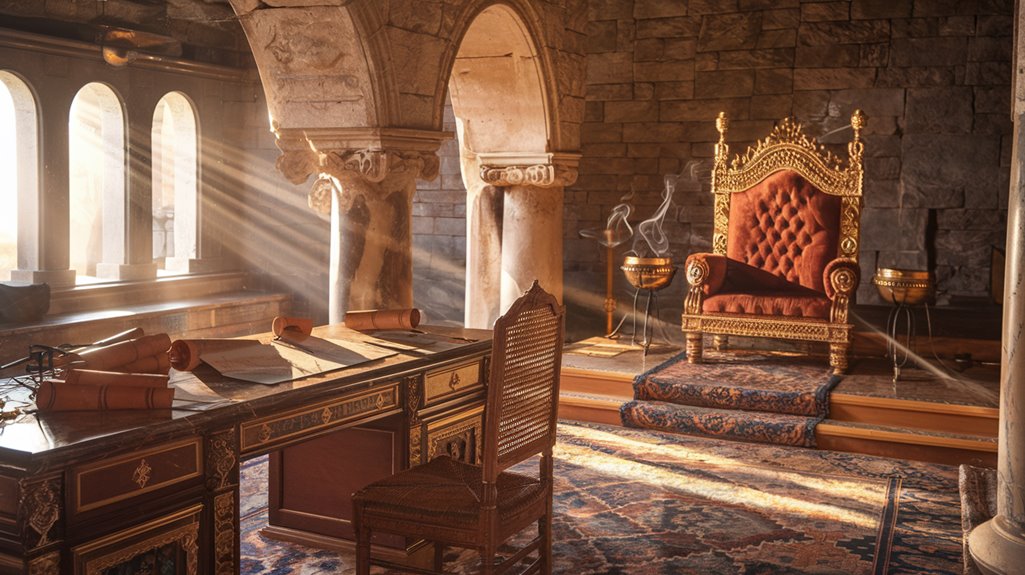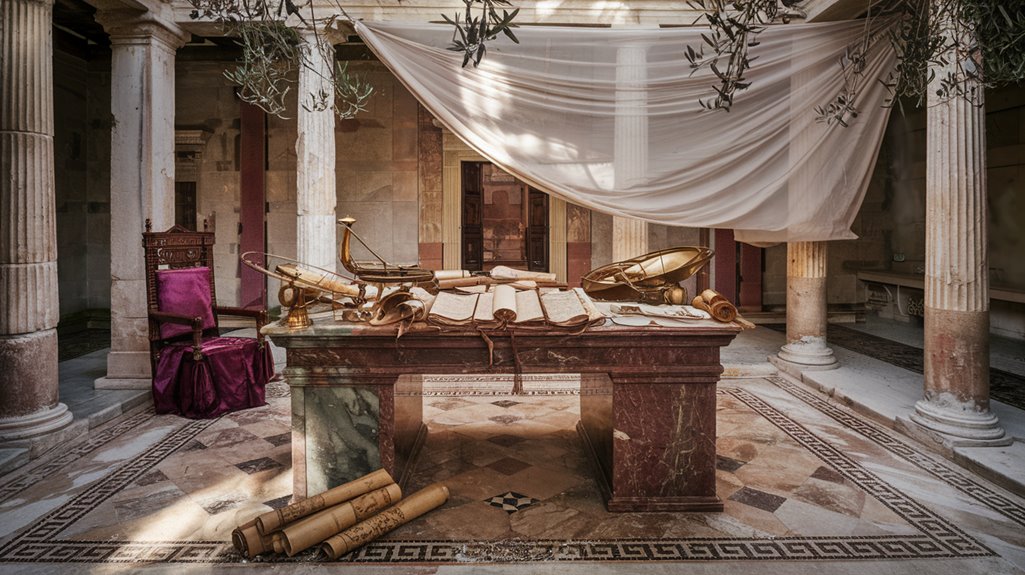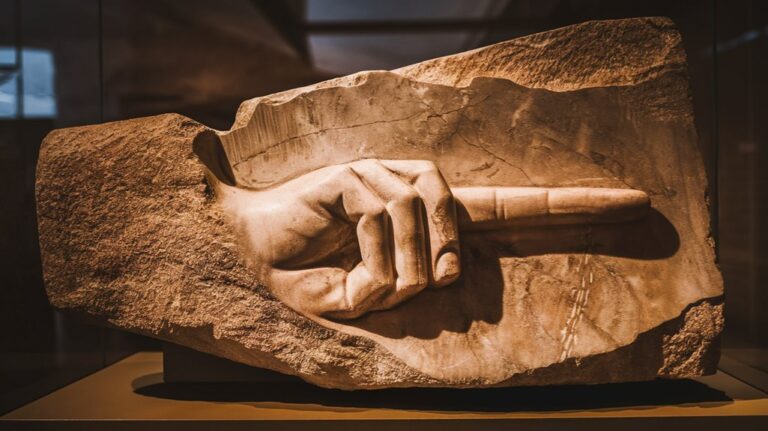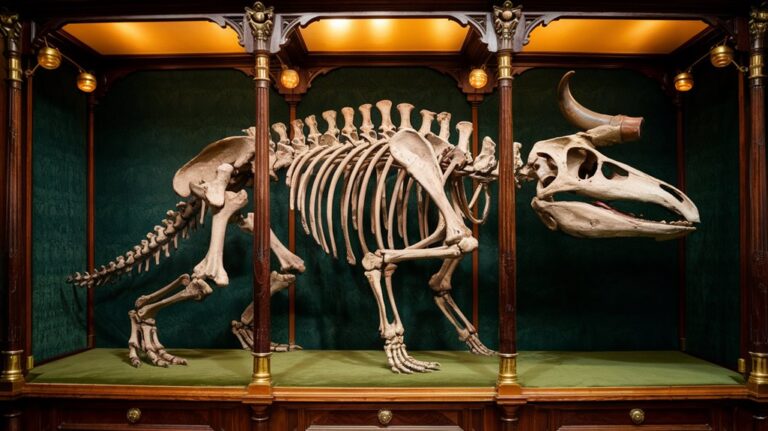Aristotle Tutored the Young Alexander the Great
You'll find few teacher-student relationships that have shaped world history quite like the dynamic between Aristotle and Alexander the Great. When King Philip II of Macedonia hired the renowned philosopher to tutor his 13-year-old son, he couldn't have known the profound impact this pairing would have. Their connection went far beyond typical lessons, combining philosophical wisdom with practical leadership skills that would influence Alexander's future conquests and cultural policies across three continents.
The Early Years: A Meeting of Two Great Minds
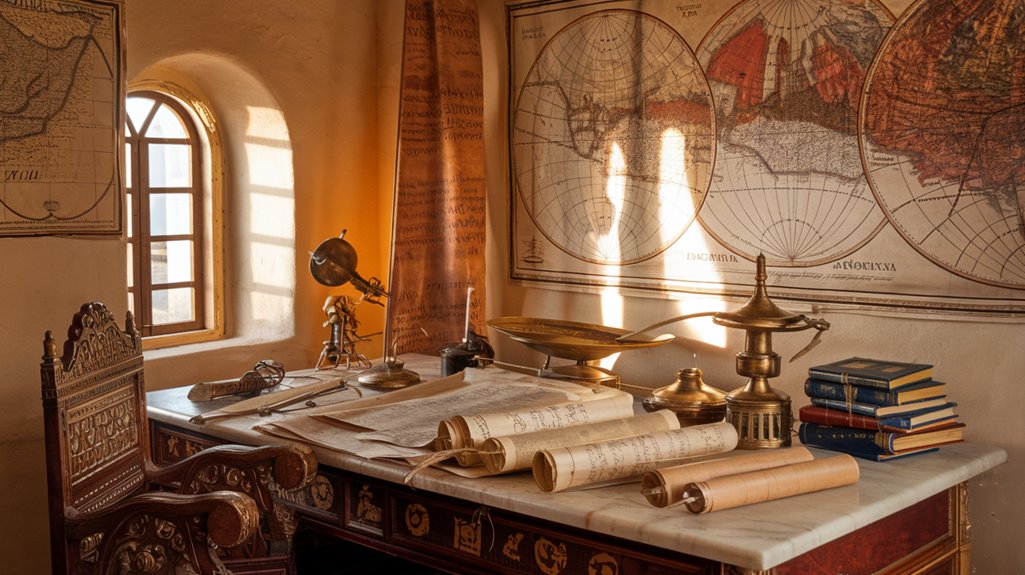
When King Philip II of Macedonia sought the finest tutor for his son Alexander, he turned to Aristotle, a former student of Plato who'd already earned recognition as one of Greece's leading philosophers.
The philosophical influences began when Alexander was just 13, as Aristotle, then in his early 40s, accepted the tutorship that would last nearly four years. The curriculum focused on rhetoric and philosophy, preparing Alexander for his future role as leader.
You'll find it interesting that Philip II's commitment to securing Aristotle's services was so strong that he rebuilt the philosopher's hometown of Stagira as payment. Aristotle's scientific studies were further supported by Philip, who assigned royal gamekeepers to assist with wildlife research.
The educational foundations were laid at the Temple of the Nymphs in Mieza, where Aristotle taught not only Alexander but also future kings Ptolemy and Cassander, along with Alexander's closest friend, Hephaestion, creating an environment rich in intellectual discourse and leadership development.
The Temple at Mieza: A Special Learning Environment
The Temple at Mieza served as more than just a classroom – it embodied Aristotle's vision for holistic education.
You'll find this remarkable temple architecture seamlessly integrated into its natural surroundings, featuring caves, fresh springs, and lush vegetation that created the perfect environment for learning and contemplation.
Between two natural caves, you'll discover a rectangular space carved from rock, complete with a portico and the Nymphaeion – a temple dedicated to the Nymphs with its distinctive two-floor arcade of Ionic columns.
The stone seats where Aristotle taught Alexander and other noble youths still remain, offering a tangible connection to this historic period.
Here, from 343-340 B.C., Aristotle taught everything from rhetoric and philosophy to natural sciences, using the serene environment to inspire observation and critical thinking.
The school's L-shaped building created an ideal setting for both lectures and discussions among students.
A nearby third cave contains stalactites noted by Pliny in his comprehensive work "Natural History."
Lessons That Shaped an Empire
Under Aristotle's guidance at Mieza, Alexander received an extensive education that profoundly shaped his future empire.
The Temple of the Nymphs provided an ideal setting for Alexander's philosophical development. You'll see the ethics application in how he governed his vast territories, emphasizing justice and virtue while pursuing moral leadership. His training in science and empirical observation enabled him to make informed decisions about military strategy and administration. Greek culture and ideals remained central to his education, as Aristotle emphasized the importance of Hellenic traditions.
The cultural impact of Aristotle's teachings manifested in Alexander's approach to empire-building.
You can trace his policy of Hellenization – the blending of Greek and local cultures – directly to his scholarly foundations. He didn't just conquer territories; he integrated them through knowledge gained from his studies in politics, diplomacy, and cultural understanding.
His intellectual curiosity, sparked by Aristotle's thorough curriculum, led him to value knowledge as much as military might.
Beyond Books: Aristotle's Teaching Methods
Aristotle's innovative teaching methods extended far beyond traditional classroom instruction at Mieza. You'd find him leading Alexander through gardens and vineyards, turning nature into a living laboratory for active exploration and discovery. His approach emphasized hands-on experiences rather than mere theoretical knowledge. The learning environment at the Temple of the Nymphs provided an ideal setting for this educational approach.
This holistic education encompassed everything from ethics to science, with Aristotle serving as a guide rather than a lecturer. You'll notice how he used the Socratic method to engage Alexander in meaningful dialogue, challenging him to think critically and develop logical reasoning skills. His dedication to virtue cultivation shaped Alexander's moral development.
Through personalized instruction, he recognized Alexander's unique potential and adapted his teaching accordingly. In natural surroundings, Aristotle created an environment where learning wasn't just about memorizing facts – it was about understanding the world through observation, experience, and practical application.
The Legacy of a Unique Teacher-Student Relationship
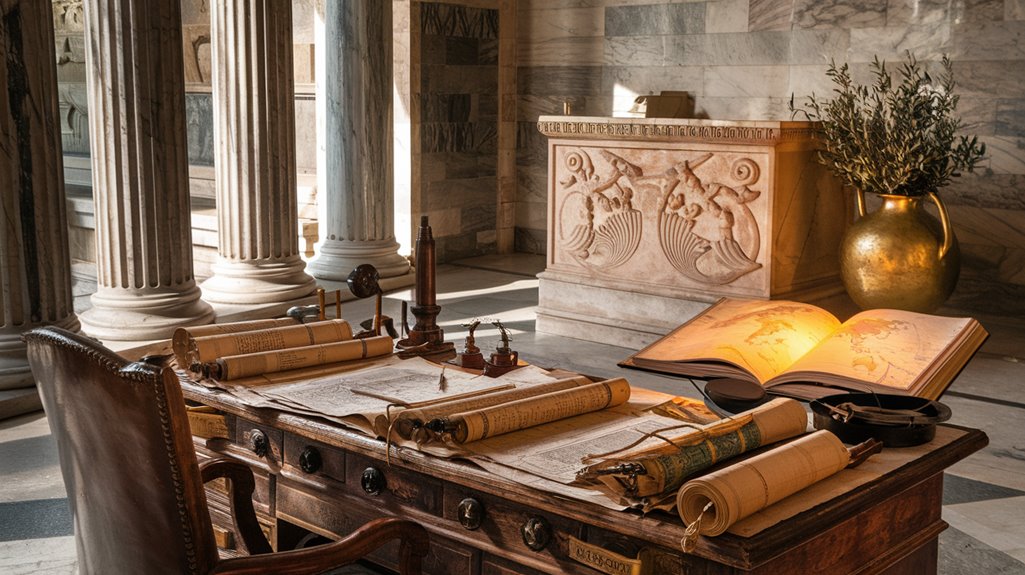
While shaping one of history's greatest leaders, Aristotle's extensive curriculum at Mieza established an extraordinary teacher-student bond that would influence Western civilization for millennia.
The mentorship impact of their relationship went far beyond traditional education, as Aristotle instilled in Alexander a deep appreciation for Greek culture, scientific inquiry, and critical thinking.
During their studies, Alexander's curriculum included intensive training in poetry and rhetoric, along with other classical subjects.
You can see this philosophical influence reflected in Alexander's later actions, from his support of scientific expeditions to his approach to cultural integration across his empire.
Though they eventually grew apart due to differing views on cultural assimilation, their relationship's legacy endured.
You'll find Aristotle's teachings evident in Alexander's diplomatic skills, leadership style, and commitment to excellence.
Their unique bond helped create a cultural and intellectual framework that would shape the course of Western history.

